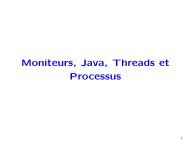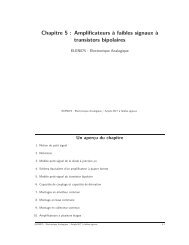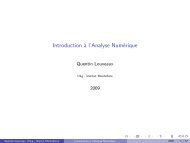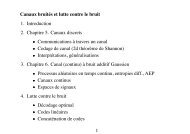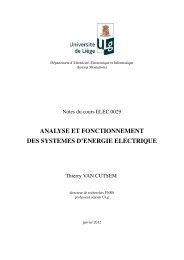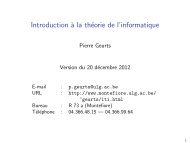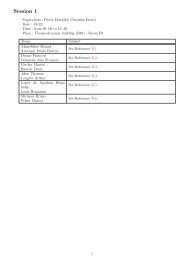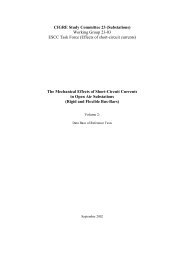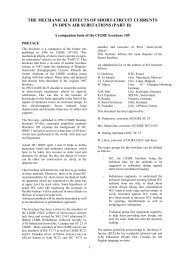Imitative Learning for Real-Time Strategy Games - Montefiore
Imitative Learning for Real-Time Strategy Games - Montefiore
Imitative Learning for Real-Time Strategy Games - Montefiore
You also want an ePaper? Increase the reach of your titles
YUMPU automatically turns print PDFs into web optimized ePapers that Google loves.
Quantity<br />
Quantity<br />
1<br />
0,5<br />
0<br />
5 55 105 155 205 255 305 355 405 455<br />
3,5<br />
3<br />
2,5<br />
2<br />
1,5<br />
1<br />
0,5<br />
Barracks<br />
Factories<br />
Starports<br />
<strong>Time</strong> Feuille2 (s)<br />
0<br />
5 55 105 155 205 255<br />
Feuille3<br />
<strong>Time</strong> (s)<br />
305 355 405 455<br />
3,5<br />
3<br />
2,5<br />
2<br />
1,5<br />
1<br />
0,5<br />
Barracks<br />
Factories<br />
Starports<br />
(a) <strong>Strategy</strong> A<br />
0<br />
5 55 105 155 205 255 305 355 405 455<br />
<strong>Time</strong> (s)<br />
(b) <strong>Strategy</strong> B<br />
Fig. 4. TrainingPage set1strategies data and applying them in full one-on-one games. However,<br />
since the training data was artificially generated, the agent<br />
is restricted to a specific matchup type. A larger and more<br />
diverse dataset would be required to significantly impact the<br />
per<strong>for</strong>mance of agents against human players. We there<strong>for</strong>e<br />
plan on extending this work to larger datasets.<br />
In order to efficiently learn from richer sets, potentially<br />
collected from various sources, we suspect clustering will<br />
be required to organize records and maintain manageable<br />
datasets. Furthermore, the manually generated training data<br />
only contained desirable production strategies. When training<br />
data is automatically collected from various sources, selec-<br />
Page 1<br />
tion techniques will be required to filter out undesirable<br />
production strategies. We believe that with a large enough<br />
set, the learned production strategy models should be robust<br />
enough to be used against human players.<br />
Besides production-related improvements, there are other<br />
areas worth investing in to increase agent per<strong>for</strong>mance<br />
such as in<strong>for</strong>mation management or combat management.<br />
Enhanced in<strong>for</strong>mation management can allow an agent to<br />
better estimate the state of its opponents and <strong>for</strong> example<br />
predict the location of unit groups that could be killed be<strong>for</strong>e<br />
they can retreat or be joined by backup <strong>for</strong>ces. As <strong>for</strong><br />
Quantity<br />
Quantity<br />
<strong>Games</strong> (%)<br />
3,5<br />
3<br />
2,5<br />
2<br />
1,5<br />
1<br />
0,5<br />
Barracks<br />
Factories<br />
Starports<br />
Feuille2<br />
0<br />
5 55 105 155 205 255<br />
Feuille3<br />
<strong>Time</strong> (s)<br />
305 355 405 455<br />
3,5<br />
3,5<br />
3<br />
3<br />
2,5<br />
2,5<br />
2<br />
2<br />
1,5<br />
1,5<br />
1<br />
1<br />
0,5<br />
0,5<br />
Barracks<br />
Barracks<br />
Factories<br />
Factories<br />
Starports<br />
Starports<br />
(a) <strong>Strategy</strong> A<br />
0<br />
0 5 55 105 155 205 255 305 355 405 455<br />
5 55 105 155 205<strong>Time</strong> (s) 255<br />
<strong>Time</strong> (s)<br />
305 355 405 455<br />
100<br />
90<br />
80<br />
70<br />
60<br />
50<br />
40<br />
30<br />
20<br />
10<br />
0<br />
(b) <strong>Strategy</strong> B<br />
Feuille1<br />
Page 1<br />
Fig. 5. Test set strategies<br />
<strong>Strategy</strong> A <strong>Strategy</strong> B<br />
Page 1<br />
Fig. 6. <strong>Strategy</strong> frequencies<br />
Training set<br />
Test set<br />
combat management, it may lead to much more efficient unit<br />
handling in battle and <strong>for</strong> example maximize unit life spans.<br />
ACKNOWLEDGMENTS<br />
Raphael Fonteneau is a postdoctoral researcher of the FRS-<br />
FNRS from which he acknowledges the financial support.<br />
This paper presents research results of the Belgian Network<br />
DYSCO (Dynamical Systems, Control, and Optimization),



